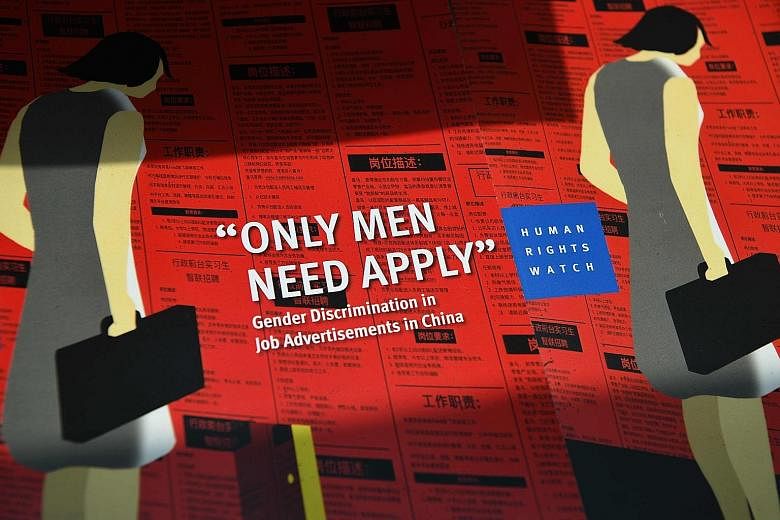HONG KONG • Top Chinese companies including e-commerce giant Alibaba have been heavily criticised for gender discrimination in job advertisements in a report released yesterday which said the landscape for the female workforce in China was deteriorating.
The report by campaign group Human Rights Watch, entitled Only Men Need Apply: Gender Discrimination in Job Advertisements in China, details a host of offences by private companies and public bodies. They range from issuing "men only" job ads to requests for women applicants to be "trim" and "aesthetically pleasing".
The ads reflect "traditional and deeply discriminatory views" that women are less capable than men and that they will not be committed to their jobs because of their role as family caregivers, it said.
Discrimination in hiring practices is contributing to a drop in the female workforce and a widening gender pay gap, the report said, adding that although such discrimination is illegal in China, rules are unclear and rarely enforced.
Tech behemoths Alibaba, Tencent and Baidu had all published job ads that openly stated a preference for male applicants, the report said. Alibaba was also accused of repeatedly using the lure of attractive female co-workers in its recruitment campaigns, describing them as "Ali beauties" and "goddesses" on social media.
Tencent, Baidu and leading telecom firm Huawei were also among the major firms that advertised the beauty of their female employees.
Speaking at the launch of the report in Hong Kong, Human Rights Watch executive director Kenneth Roth said CEOs must take the lead.
"There's just a blatant objectification of these women," said Mr Roth. "This creates a hostile work environment," he said, adding that it is "an issue that that affects 700 million people".
Tencent issued an apology after the report's publication, saying the company is investigating the incidents and seeking to make "immediate changes". A spokesman said: "We are sorry they occurred and we will take swift action to ensure they do not happen again."
Alibaba said in a statement that it would "conduct stricter reviews" of recruitment ads to ensure they complied with its equality policy.
Baidu said the job ads in question had been removed before the release of the report and that it regretted any adverts that did not reflect its values.
Huawei did not respond to AFP's request for comment.
The 99-page report analysed more than 36,000 job advertisements posted between 2013 and 2018 on Chinese recruitment and company websites and on social media platforms.
Government departments were also at fault. Nearly one in five job ads for China's 2018 national civil service called for "men only" or "men preferred".
Adverts for female train conductors required them to be "trim", "fashionable" and "beautiful".
Ms Ma Rui, a San Francisco-based angel investor, said the term "yanzhi", or physical appearance metric, is part of everyday business language. "The underlying idea is that it's totally normal to rely on your 'yanzhi' as a primary job competence," Ms Ma said.
"People don't really question it. It sounds extremely offensive but it's been normalised. It's going to be extremely hard to fight."
AGENCE FRANCE-PRESSE, BLOOMBERG

